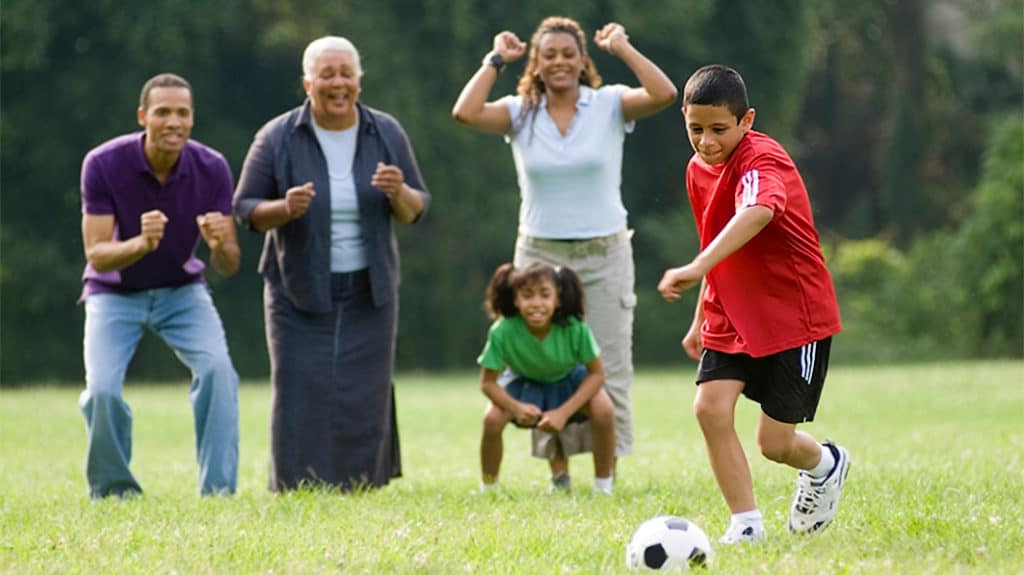
How Practicing Spiritual Disciplines Can Positively Impact Your Mental Health
Throughout church history, people who know Jesus as their Lord and Savior have practiced spiritual disciplines. Spiritual disciplines are habits that help a Christian grow

Physical activity is important to healthy child development but parents need to know how to prevent and respond to head injuries that may result in concussions.
Your child has suffered a sports related head injury. But what exactly does that mean? Does she have brain damage? If so, will it be permanent? How long will it take to heal? Will your child be able to return to sports? What do you know about responding to a child’s head injury? Could she have a concussion? If so, you might consider what parents need to know about concussions.
The seriousness of concussion and head injuries has drawn a lot of attention in recent years, in large part because of problems linked to professional football.
But these injuries have become a distressing issue for parents since they don’t just occur among pro athletes. Children and teens can experience concussions too. And they can occur not just in collision sports like football but in non-contact or limited-contact activities as well[i].
What is a concussion?
A concussion is an injury to the brain that can be caused by a blow to the head, a hard hit to the body, or a whiplash type of event. This can stretch or damage blood vessels in the brain and affect how the brain’s neurons function.
A concussion is not just a “brain bruise” as some think of it. It’s a total change in the way the brain works.
It’s always better to avoid a problem such as a concussion than to treat one afterward. Here are some ways to reduce the risk of a student athlete sustaining a concussion.
What parents need to know about concussions is that often kids won’t reveal an injury that may have caused a concussion. Under-reporting by athletes is common, making timely assessments and responding to a child’s head injury difficult. Your child may not want to report symptoms out of fear of being pulled from play, having their commitment to the team questioned, or being labeled “weak.” Athletes may downplay symptoms, placing their brain health at risk. That’s why parents, trainers, and coaches must be vigilant for warning signs of a concussion.
Common signs and symptoms of a concussion include:
A common misconception is that concussion sufferers are likely to be “knocked out” by the immediate injury or impact. In fact, roughly 90% of concussions do not result in a loss of consciousness. Furthermore, loss of consciousness is not required for an injury to be considered serious.
If you suspect your child has a concussion, you need to contact your family physician or sports medicine clinic and ask if they are part of a Sports Concussion Alliance. If so, they will direct you to the correct provider for evaluation.
Responding to a child’s head injury shouldn’t be done in isolation. Keep your child out of further sports participation until a health care professional experienced in evaluating for concussion says that he is symptom-free and it’s okay to return to play
A very important part of a concussion program is “ImPACT” (Immediate Post-concussion Assessment and Cognitive Testing). This computer based evaluation typically takes 25-30 minutes and measures verbal memory, visual memory, and reaction time.
It is highly recommended that baseline ImPACT testing for athletes begin at age 10. By establishing a baseline for pre-concussion cognitive function, tests performed after an injury can be compared to earlier results to help determine if an athlete suffered a concussion. ImPACT scores may also help determine when an athlete is ready to return to normal activities.
What parents need to know about concussions is that even with ImPACT testing, concussions cannot be so easily diagnosed or dismissed. Many parents think ImPACT testing is a pass/fail test, that it can tell us with certainty whether or not the athlete had a concussion, or whether or not they have completely recovered. This is not the case. Although it is often a helpful and important part of the puzzle, it is only one of the pieces of information physicians use. Physicians also use symptoms, physical exams, and parental observations to help determine whether concussion has occurred and when the athlete is fully recovered.
You should also know that a CT or a MRI scan is usually not done simply because a concussion may have occurred. A concussion is a functional or cellular level injury. It is not a structural or anatomic abnormality that these scans can detect. An athlete with a concussion will typically have a normal brain scan
Furthermore, what parents need to know about concussions is that if problems occur, they will do so in the first 48 to 72 hours after a concussion. You should not leave your child alone during this time. However, you do not need to wake her up periodically.
Rest is critical in the recovery. If your level of concern causes you to wake her up, then the child needs to go to the emergency room for evaluation.
Likewise, if you notice any of the following, your child needs to be evaluated in the emergency room:
Of course, if a doctor is worried about bleeding within the head and the child has symptoms that would suggest the need to go to the emergency room and that’s when a CT or MRI scan would be done.
If your child’s health care team determines that your child has likely had a concussion, treatment will begin.
Your child’s health care provider can provide written instructions on helping your child get back to school. You can give the instructions to your child’s school nurse and teacher(s) and return-to-play instructions to the coach and athletic trainer. What parents need to know about concussions is that most will feel better within a couple of weeks. Others, however, will have symptoms for months or longer.

The following guidelines are used to help your concussion alliance team determine when it is safe for your child to return to athletics:
This last item describes a return to activities, including sports, that is supervised by a physician, PA, or NP. This reengagement is based on improvement of signs and symptoms.
You may be naturally wary about your child returning to sports, especially the sport in which she experienced the injury. This is something you should talk about with your child. You should also talk with her doctor to address any other concerns.
Make sure to speak with your child’s coaches. While some sports are riskier than others and coaches can’t guarantee that a concussion won’t happen again, ask if the coaches have any plans to minimize the likelihood of subsequent head injuries.
It’s been shown that athletes who return to sports before complete recovery are more susceptible to additional concussions, even with a much lighter trauma. Likewise, athletes who have suffered from a severe concussion, or multiple concussions, can become more susceptible to another concussion.
Concussions that occur while the brain is still healing from a previous one can be very serious and can affect a child or teen for a lifetime. In extreme cases, the damage can be fatal. That’s why it is crucial that your child make a complete recovery before returning to athletic activities that could pose further concussion risk.
A second impact or injury which occurs before the brain has a chance to heal can lead to “second impact syndrome” or what is called “post-concussion syndrome.” PCS can worsen and will typically occur in its most severe form after a series of concussions.
There are symptoms that could develop months later and result in:
Some parents may think, “This list could describe a child going through puberty, an adolescent in rebellion, or a middle schooler!” Fortunately you’re in the best position to know what’s normal for your child and to recognize abnormal behavior patterns.
It can be difficult to determine if any permanent damage has occurred after a child’s head injury has resulted in a single concussion. A physical exam that indicates no problems and normal ImPACT testing would suggest that damage is not permanent.
However, it is possible that lasting damage can occur from a single severe concussion, or from multiple concussions, so parents, coaches, and trainers should always take head injuries seriously
In order for your child to benefit from a concussion program, preliminary work has to be performed. This type of program just doesn’t happen without input of interested physicians, therapists, school administrators, athletic directors and parents. A concussion team should be established and functioning in your school program before head injuries occur so that appropriate referrals and communication between parents, school and health care providers can occur. Also, the appropriate baseline testing can be offered to your child. If you’re not sure whether your child’s school has a concussion program, talk with the athletic director, coaches, or school administration.
The Bible says that…“Discretion will protect you, and understanding will guard you” (Proverbs 2:11). Of course the writer wasn’t talking about preventing sports injuries, but his insight applies to all things. Directing wisdom and knowledge toward the situations we face in life, and sports, can only help us. One way to apply wisdom and knowledge to help reduce the likelihood of a child’s head injury resulting in a concussion is to play by the rules, use proper technique, and wear the right gear.
Unfortunately, there is no way to guarantee that concussion will not occur in sports, even when the best advice is followed. In those times, we have the privilege of taking our problems to the Lord: “Give all your worries and cares to God, for he cares about you” (1 Peter 5:7, NLT). We need to bring our concerns to Him in prayer, trusting that “He will lead our paths” as we navigate the diagnosis and treatment of our child’s concussion
CONCUSSION WEBSITES:
Concussion 101 Guide – from Impact Applications, Inc.
HEADS UP to Youth Sports – a resource from the Centers for Disease Control and Prevention concerning sports injury
APP: CDC HEADS UP Concussion and Helmet Safety – an app from the CDC which places concussion information at your fingertips.
© 2019 Phillip Stiver, M.D. All rights reserved. Used with permission.




Phillip Stiver is a physician and a member of Focus on the Family’s Physician’s Resource Council.

Throughout church history, people who know Jesus as their Lord and Savior have practiced spiritual disciplines. Spiritual disciplines are habits that help a Christian grow

How should we approach giving an allowance for our kids? How do we use chores to help our kids learn responsibility without just paying them for work?

Should I be concerned about my child sleeping too much? How much sleep is too much sleep? What can I do to build healthy routines in my home?